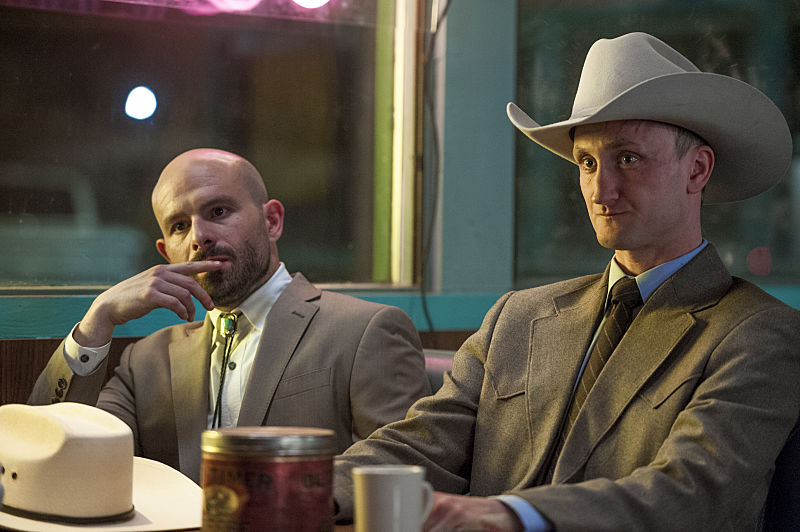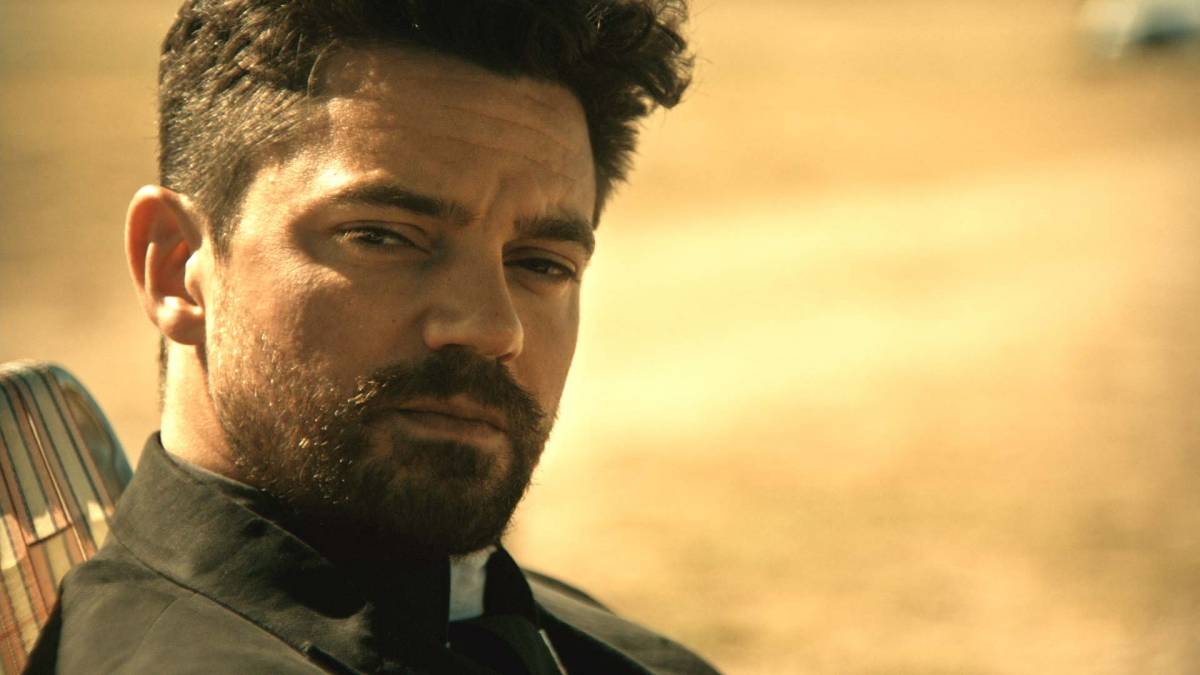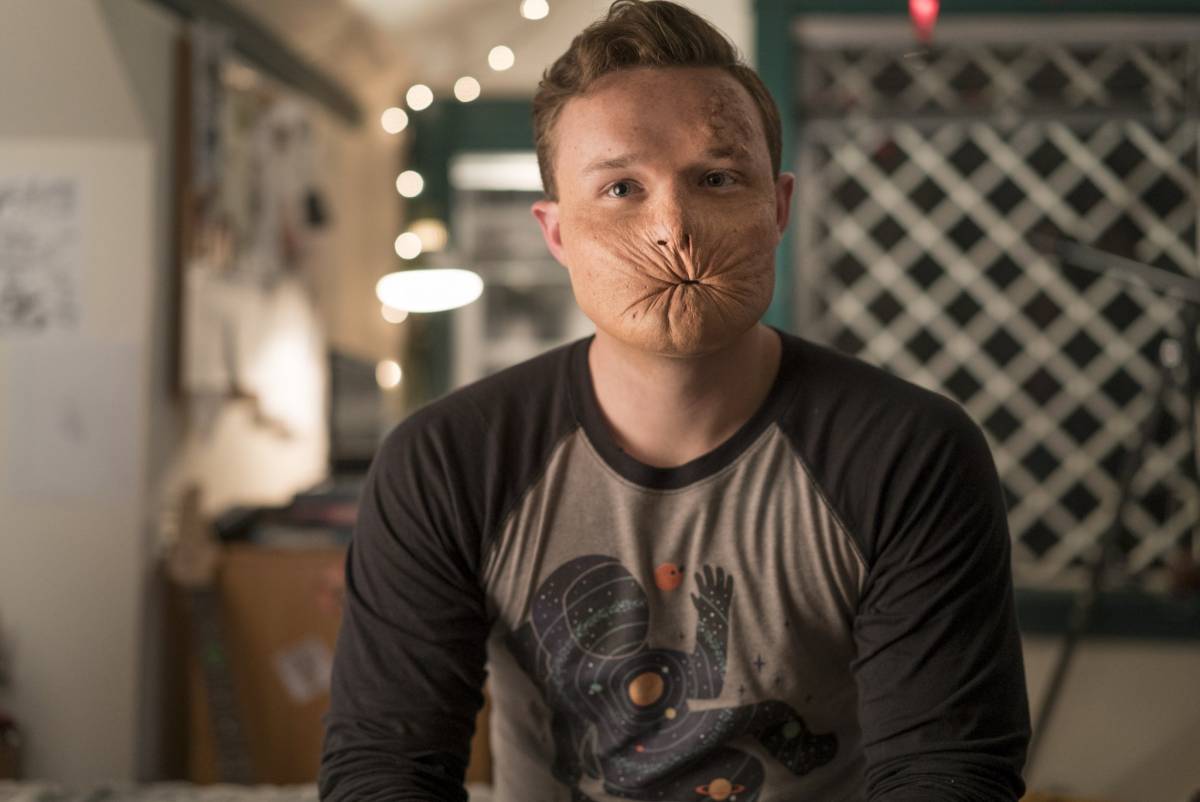I recently sat down to get caught up on the latest episodes of Preacher late last week, and found myself turned off by the show once again. After an impressive premiere that saw the stakes for Jesse, Tulip, and Cassidy raised considerably, the second episode of the AMC drama’s sophomore season saw the suicide of a central character repeatedly played for laughs, up to and including his eventual success.
Fiore, an angel in the Preacher universe, was left despondent due to the loss of his fellow angel, and only friend, DeBlanc. He had become a stage performer after attempting to kill himself during an entertainer’s live show at a Vegas hotel. As if the montage of suicides wasn’t bad enough, the fact that the whole emotional pay off of his eventual death, after he asks The Saint of Killers to murder him on stage, is undercut completely by having his actual demise booed by an audience of spectators, only adding insult injury.
Did anyone find this funny? If so, I would be interested to know what other things you laugh at. Perhaps a dog being set on fire is worth a chuckle or two, or maybe an infant chucked from a four story window? In principle I understand the laughs are supposed to come from two sources: one being the inherent dark humor of the situation, and the other being the subversion of audience expectation.

Lewis Jacobs/Sony Pictures Television/AMC
On paper both can be used to glorious effect when utilized by a pair of talented hands. See the films of the Coen brothers or the work of Quentin Tarantino for a pile of examples of how to do this sort of thing correctly. The problems don’t come from the notion of using humor this way, but from crafting a world where nothing matters, just for the sake of a few cheap laughs.
Take the episode that followed, a story which began with the origin of Arseface, aka Eugene Root. Now, as you might have guessed, Eugene is called Arseface because his face looks like an arse. Two guesses as to how his mangled face got that way? You got it, it was a bungled suicide attempt. Now this had all been firmly established in season one, but the back story that lead up to this event had never truly been made clear.
The opening of the episode clears this up in absolutely stomach-churning fashion. Eugene, seen here with a perfectly normal face, is shown riding his bike over to the house of Tracy, a female friend who he obviously has deep feelings for. When he arrives, he finds her weeping inconsolably over the information that her boyfriend was receiving oral sex under the bleachers by a girl Tracy refers to as a “five at best”. She then reveals a shotgun, and her plan to commit suicide, not because of the betrayal of being cheated on, or the sadness of the dissolution of her relationship, but because of the embarrassment of her boyfriend cheating on her with such an unattractive girl.

AMC
Are we laughing yet? Are there enough yucks in the house? No? Well that’s alright because Eugene successfully talks Tracy out of the suicide, and in an ill-fated moment, decides to kiss her, revealing his affection for her. For a moment Preacher is borderline sweet, if a little creepy, which means that obviously the writers have to double down and make the situation even more gross. So what do they do? They have the girl mutter: “Ew.” and revert to her plan to commit suicide.
Though the attempt is botched by Eugene’s last minute intervention, we still get the gory blast of blood and skull fragments as Tracy is left half-conscious on the bed. Don’t worry ladies and germs, we’re not done with the laugh riot yet. As Tracy’s mother begins banging on the door and asking what’s going on, we might as well cue the Benny Hill theme, for we’ve got to watch Eugene put the pieces of Tracy’s brain back in while searching for a cowboy hat to try and cover up the wound. This wacky turn of events is eventually brought to a merciful end when Eugene escapes out of Tracy’s bedroom window, and holy shit, am I still watching this?
Well, as you might have guessed from the title of this article, no, I’m not. As mentioned above, the problem here isn’t with the use of dark humor itself but with what it means to this world. If you want examples for how to play off horrible violence and desperate situations for the occasional laugh, there’s tons of great stuff to choose from. When done right, dark humor can be effective, subversive, and even disturbing, while still allowing for a chuckle or two. Films like From Dusk Til Dawn, American Psycho, The Devil’s Rejects or Ravenous are just the tip of the iceberg for a few instances of how to do this right.

The difference here is that Preacher is a serialized story. In order for anything to matter in this world, you have to feel like things matter. Death, and particularly suicide, should not be played off for laughs two episodes in a row. Why? Because this undermines the struggles of the rest of the characters, and makes everything else feel trivial by extension. What does anything matter in a world where a heart-broken teen, dealing with the suicide of a close friend, is meant to be a laugh riot? Or a world where a depressed person attempts to take his life dozens of times only to fail, and be greeted by a volley of boos when he finally succeeds? What the hell meaning is there in anything on this show?
If even plot points this dark and desperate are used for zero gravitas or sincerity, what’s the point of watching Preacher at all? This isn’t a series of grim-dark SNL sketches, this is supposed to be a serialized drama where we tune in every week because we care about these characters. I mean, isn’t it?
If it’s not, then “Bravo”, I say, to Seth Rogen and his jolly band of show-runners. Maybe in a world where absurdist comedy is the kind of thing we see on the daily news pretty regularly, there’s something of value to be found in a show like Preacher. Perhaps when falling into the chasm of utter nihilism and hopelessness that our planet seems to be continuously hurtling toward, we can find an ugly mirror in a show like this, but I’m certainly not interested in seeing it.
If no one involved in this show cares about these characters or what they’re going through, why the hell should the audience?
Some of the coverage you find on Cultured Vultures contains affiliate links, which provide us with small commissions based on purchases made from visiting our site. We cover gaming news, movie reviews, wrestling and much more.



